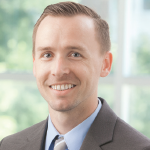 Bryant England, MD
Bryant England, MD
Assistant Professor, Division of Rheumatology & Immunology, University of Nebraska Medical Center (UNMC); VA Nebraska-Western Iowa Health Care System, Omaha, Neb.
Background: Dr. England says he chose a career in rheumatology because of the fascinating pathophysiology of the diseases and the critical-thinking required to diagnose and treat the conditions. Originally from a small town in rural Iowa, he says he’s enjoyed the interactions with faculty and peers during his fellowship as much as the diverse learning opportunities.
Working with rheumatologist Ted Mikuls, MD, MSPH, at UNMC, Dr. England’s research now focuses on “the identification and assessment of comorbidities and their contribution to disease outcomes, such as mortality.” He’s assessed the validity of comorbidity measurements in patients with rheumatic disease, and more recently explored cause-specific mortality in U.S. veterans with RA. That work, he explains, found that circulating cytokine and chemokine concentrations predicted future cancer mortality in RA patients. “Having a great mentor is essential to achieving your goals,” he says.
Dr. England served on the ACR Fellows-In-Training Subcommittee, and as a fellow liaison to the ACR Quality of Care Committee. He’s currently leading the ACR Update on Recommended RA Disease Activity Measures project. He’s received several awards, including a Rheumatology Research Foundation Resident Research Preceptorship and the Marshall J. Schiff, MD, Memorial Fellow Research Award at the 2016 ACR/ARHP annual meeting.
‘To maximize your gains during this finite time period, it’s critical to determine what knowledge, skills & experiences you need.’ —Dr. England
Q: Why rheumatology?
A: The field is rapidly changing, from novel biomarkers to assist with diagnosis or disease phenotyping, to emerging treatment strategies and therapeutic options. These advancements make every day in the clinic or hospital interesting, and stimulate the next round of research questions.
Q: What does the ACR mean to an early-career rheumatologist?
A: The ACR does a great job advocating for our patients, supporting clinicians and helping advance the field through exciting research. I’m also very thankful to the ACR for all the educational opportunities they provide for trainees.
Q: Where do you want to be 10 years from now?
At UNMC and Nebraska-Western Iowa VA in the role of a clinician-investigator, using big data to make discoveries that improve outcomes for patients with RA.
Q: What advice do you have for the next generation of rheumatology fellows?
A: There’s a tremendous breadth of information you can learn during your fellowship. To maximize your gains during this finite time period, it’s critical to determine what knowledge, skills and experiences you need to prepare you for where you want to be when you’re done.



